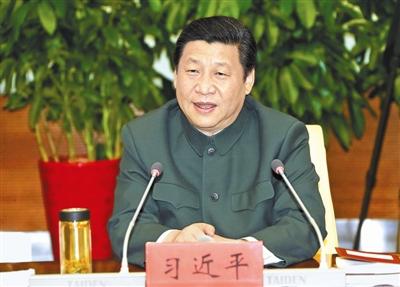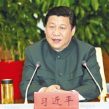
Newest Small Leading Group to ‘Deepen Reform of National Defense and the Military’
Publication: China Brief Volume: 14 Issue: 6
By:

The formation of a new committee for military reform at the top echelons of China’s Communist Party suggests that the Chinese leadership is beginning a concerted push to restructure the People’s Liberation Army (PLA). The creation of the new Small Leading Group for Deepening Reform of National Defense and the Military, a subcommittee of the top-level Central Military Commission was announced in state media on March 15 (Xinhua, March 15). The formation of a new top-level group is big news in China, and it received immediate attention from international media (Reuters, March 16). The new group appears in some ways to follow the model of other small groups established during the past year. However, given the established power of the General Secretary of the Party over the military, its political rationale and goals are less clear.
A Push for Rapid Reform
Speaking to military delegates at the recent National People’s Congress (NPC), Xi declared his intentions to make big changes fast. He stated that China is currently enjoying a “window of opportunity” to accomplish military reform. Picking up on this theme, speeches by the delegates emphasized that the military is at a critical juncture for reform: “If we seize this moment, reform may be accomplished in one fell swoop; if we let it pass by, we will lose a great opportunity” (PLA Daily, March 12).
This window of opportunity consists of favorable environments for reform both within China and internationally. Internally, China enjoys rapid GDP growth, which allows it to fund rapid upgrades to PLA capabilities. Internationally, it enjoys peace and “a period of adjustment in the relations between great powers,” allowing China to narrow the gap with “world powers” (the United States is not mentioned by name) (PLA Daily, March 12; Xinhua, February 27). The broader national project of reform is also cited as an important part of this window—and, as Xi noted at the NPC, military reform is an important part of comprehensive reform. Chen Zhou, a researcher at the Academy of Military Science and a PLA delegate at the NPC, said in his speech that national reform is the “foundation” for military reform, and that military reform must be accomplished during a time of peace (PLA Daily, March 12).
Despite being thus likened to other, similar bodies formed the past few months—the Small Leading Group on Comprehensively Deepening Reform, the National Security Council and the new leading group on cyber-security—the new military reform body appears to have some significant differences. The other groups seem to have two major functions: First, they provide alternative power centers to get around mistrusted bureaucratic actors such as the National Development and Reform Commission and the Political-Legal Commission—a tactic exploited by Mao Zedong in launching the Cultural Revolution, during which the Small Leading Group for Cultural Revolution pushed aside the Politburo as China’s highest authority. Second, they provide coordination between separate bureaucracies with shared responsibilities for issues like stability and cyber-security. From this point of view, it is not clear what advantage the new military reform group has over the existing Central Military Commission (CMC), also headed by Xi. It appears to have responsibility for the same organizations. Furthermore, where the other groups pointedly exclude many of Xi’s colleagues, the other two members of the military reform group who have been named publically are the two vice chairmen of the CMC, Generals Fan Changlong and Xu Qiliang (CCTV, March 16).
The formation of the new leading group could simply be a way of signaling Xi’s determination to accomplish military reforms. Alternatively, as more of the membership is revealed, we may find that it excludes other figures more tied to the “old guard.” The arrest on corruption charges of retired General Xu Caihou, a powerful figure who recently aged out of the vice chairmanship of the CMC, may confirm that Xi is targeting a power group in the PLA (South China Morning Post, March 19). Finally, by tying long-desired restructuring goals to “reform,” Xi may simply be bringing established military priorities behinds his political banner.
Understanding the Goals
What will a reformed PLA look like? While touching upon ideological elements, Xi’s speech at the NPC—and commentaries published in PLA Daily, Xinhua, and the ideological journal Seeking Truth have emphasized the more practical ability to “fight and win wars.” This, Xi explained, requires organizational changes: “Without a modern form of military organizations, there can be no national defense and military modernization. We must further promote the reform of the command structure, force structure, policies, systems, etc., to build strong national defense” (PLA Daily, March 16). The formation of the group was also followed by guidance from the CMC on raising training standards, answering Xi’s call for a more professional and capable military (PLA Daily, March 20).
While the PLA’s command and force structure have been on reform lists for years, they have so far proved to be extremely challenging to change: Despite the rising importance of naval operations and aviation in China’s maritime disputes, PLA national and regional headquarters remain dominated by ground forces officers. They have, so far, resisted efforts to empower the other branches in order to create a joint command structure.
This last may be the explanation for the political necessity of a new small leading group—as well as another conundrum about Xi’s approach to the military. Since coming in, Xi has continually stressed the need for the PLA to “absolutely obey the commands of the Party.” Many analysts have read this as either an empty reiteration of Party dogma, or as reflecting concerns about generals “going rogue.” There is little real doubt about the General Secretary’s ability to command operational decisions—but military officers have successfully resisted recent reforms to their bureaucratic structures. This may be the area in which Xi is concerned about military disobedience—and which the new small leading group has been created to break through.
For more in-depth coverage of the obstacles to reform, and the role of the Party’s ideological guidance in overcoming them, see “Restructuring the Military: Drivers and Prospects for Xi’s Top-Down Reforms” in China Brief, February 7.





